
The Epione robot eliminates the need for multiple check scans during surgery by allowing physicians to target a tumor with a single button press, according to Govindarajan Narayanan, MD.

Your AI-Trained Oncology Knowledge Connection!


The Epione robot eliminates the need for multiple check scans during surgery by allowing physicians to target a tumor with a single button press, according to Govindarajan Narayanan, MD.

Concluding their discussion, Drs Advani, Parrondo, and Chanan-Khan conclude that second-generation BTK inhibitors are the preferred first-line treatment in patients with chronic lymphocytic leukemia due to better efficacy and lower cardiovascular risk, with emerging therapies promising even better outcomes.
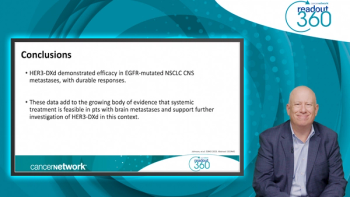
A medical oncologist reviews intracranial efficacy data from HERTHENA-Lung01 on patritumab deruxtecan (HER3-DXd) in patients with previously treated advanced EGFR-mutated NSCLC.

Alexander I. Spira, MD, PhD, FACP, reviews recent data from MARIPOSA-2 looking at amivantamab plus chemotherapy, with or without lazertinib, in EGFR-mutated advanced NSCLC.

Doctors discuss that while cardiovascular side effects like atrial fibrillation and hypertension in patients with chronic lymphocytic leukemia are concerns with BTK inhibitors, they are manageable and should not deter prescribing these effective therapies; generally, atrial fibrillation is considered more challenging to manage than hypertension.

The Epione robot may help less experienced surgeons carry out complex cases with a high level of accuracy, says Govindarajan Narayanan, MD.

Joselle Cook, M.B.B.S., explains that she believes that elderly patients with relapsed/refractory multiple myeloma can still use bispecific therapies, though more objective data on frailty is needed.

Drs Costa, Dhakal, and Cook discuss managing the unique toxicities of bispecific antibodies in patients with relapsed/refractory multiple myeloma such as infections requiring prophylaxis and supportive care, and quality-of-life complaints like taste changes and skin issues.

Domenica Lorusso, MD, PhD, says that paying attention to the quality of chemoradiotherapy is imperative to feeling confident about the potential addition of pembrolizumab for locally advanced cervical cancer.

Exercise and healthy lifestyles can lower the risk of cancer or the symptoms of cancer treatment despite having genetic dispositions, said Neil M. Iyengar, MD.

Cell therapy and vaccine approaches are among the several potential options for targeting KRAS in patients with KRAS G12C–mutated non–small cell lung cancer, says Sandip P. Patel, MD.

In the Phase 2 MOUNTAINEER-01 study of patients with HER2-positive metastatic colorectal cancer who were chemo-refractory, the combination of tucatinib and trastuzumab showed an impressive response rate and disease control rate, and median duration of response up to 12 months; Dr. Ahn notes these results compare favorably to prior studies of dual HER2 inhibition, with MOUNTAINEER-01 showing higher response rates.
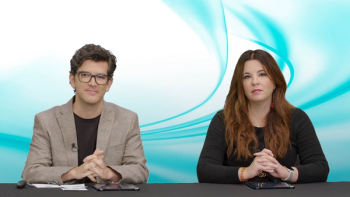
Gain insight into strategies for monitoring for ICANS and CRS in myeloma treatment, including inpatient and outpatient administration, tocilizumab, dexamethasone, and impact on patient care.
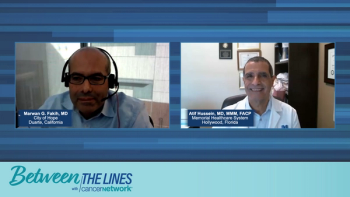
Comprehensive insights on the stratification, diagnosis, and treatment of patients with metastatic colorectal cancer.

The panel continues their discussion on adverse effect management with a focus on GPRC5D-targeting bispecific antibodies in multiple myeloma.

Multiple myeloma specialists discuss the management of toxicities from BCMA-targeting bispecific antibodies.

Key opinion leaders share their insight on managing adverse events in myeloma treatment, including dose adjustments and prophylactic strategies to improve outcomes and patient quality of life.

Marwan G. Fakih, MD, and Atif Hussein, MD, MMM, FACP, introduce themselves and give an overview of metastatic colorectal cancer (mCRC).

Christina S. Wu, MB, BCh, MD, presents the case of a 50-year-old man with metastatic colorectal cancer to the panel for discussion.
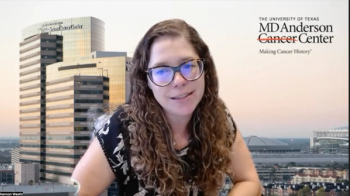
Future analyses will look at durvalumab/olaparib for endometrial cancer populations with TP53 and POLE alterations, as well as those with estrogen receptor and progesterone receptor positivity.
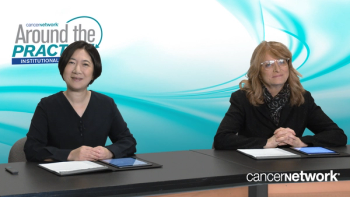
Drs Janellen Smith and Misako Nagasaka discuss dermatological adverse events in patients with non-small cell lung cancer associated with EGFR tyrosine kinase inhibitors, offering advice on prevention, treatment, and when to involve a dermatologist.

Expert insight into monitoring patients with advanced kidney cancer, covering the frequency of clinic visits, blood work, and CT scans, as well as signs and symptoms that might indicate disease progression.

Shared insight into the complexities in treating EGFR mutant lung cancer during the second-line therapy phase, including safety profiles of different treatment regimens, managing toxicities, and ongoing research to improve patient outcomes.

Dr Sai-Hong Ou and Dr Misako Nagasaka discuss the treatment strategies for EGFR-mutant non-small cell lung cancer, emphasizing the importance of individualized decision making and a multidisciplinary approach.

Reviewing the case of a case of a 73-year-old man with metastatic clear cell kidney cancer, experts discuss second-line treatment options informed by prior treatment response, patient goals, and adverse event profiles.

Experts consider the influence of combination therapies on EGFR-mutant lung cancer treatment, including the impact on central nervous system (CNS) response, challenges in CNS metastases management, and the potential alternatives to whole-brain radiation.

Additional research is needed to confirm whether capivasertib/fulvestrant offers increased benefit in patients with locally advanced or metastatic breast cancer not harboring AKT pathway alterations.
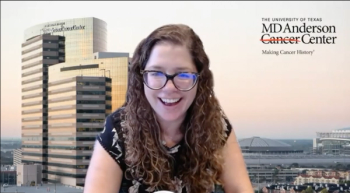
Patients with mismatch repair proficient, newly diagnosed, advanced or recurrent endometrial cancer may have enhanced benefit with the addition of olaparib to durvalumab.

Paolo Tarantino, MD, gives an overview on how the recently approved combination of capivasertib plus fulvestrant can help improve treatment strategies for patients with locally advanced or metastatic breast cancer that is hormone receptor–positive, HER2-negative breast cancer

Ricardo Parrondo, MD, explains that different BTK inhibitors have varying rates of cardiovascular side effects in patients with chronic lymphocytic leukemia, suggesting the choice between them should consider a patient's preexisting cardiovascular conditions, with acalabrutinib favored for hypertension concerns and zanubrutinib for atrial fibrillation issues.